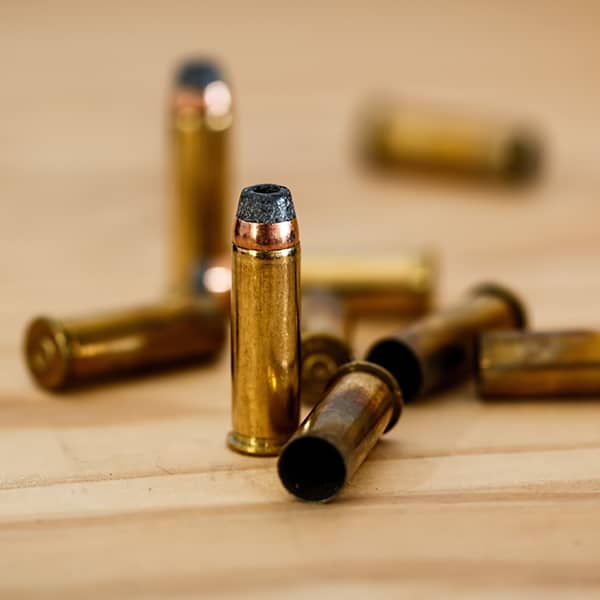Memphis Gun Charge Lawyer
Facing gun charges in Memphis? Most gun crimes in Tennessee are under Part 13 of Chapter 17 of Title 39 of the Tennessee Code. This is the section of state law dedicated to weapons under offenses against public health, safety, and welfare. Any person facing any gun charge in Tennessee will want to have an experienced Memphis gun charge lawyer to help fight criminal charges.
Tennessee Gun Law
Tennessee Code § 39-11-106 defines a firearm as “any weapon that will or is designed to or may readily be converted to expel a projectile by the action of an explosive, the frame or receiver of any such weapon, any firearm muffler or firearm silencer, or any destructive device Tennessee state weapon laws govern the use, possession, transfer, and sale of weapons, and crimes could be misdemeanors or felony offenses depending on the alleged violation.
Types of Gun Charge Cases Our Memphis Gun Charge Lawyer Handles
Some of the most common gun charges people face in Memphis include:
- Prohibited weapons, Tennessee Code § 39-17-1302
- Unlawful sale, loan, or gift of a firearm, Tennessee Code § 39-17-1303
- Restrictions on firearm ammunition, Tennessee Code § 39-17-1304
- Carrying weapons during judicial proceedings, Tennessee Code § 39-17-1306
- Unlawful carrying or possession of a weapon, Tennessee Code § 39-17-1307
- Carrying weapons on school property, Tennessee Code § 39-17-1309
- Carrying weapons on public parks, playgrounds, civic centers, and other public recreational buildings and grounds, Tennessee Code § 39-17-1311
- Providing handguns to juveniles, Tennessee Code § 39-17-1320 –
- Possession of handgun while under the influence, Tennessee Code § 39-17-1321
- Possessing a firearm or antique firearm during commission or attempt to commit a dangerous felony, Tennessee Code § 39-17-1324
Aggravating and Mitigating Factors
Gun charge cases may involve mitigating or aggravating factors that could impact the possible punishment a court might impose. Under Tennessee Code § 40-35-113, mitigating factors include:
- An alleged offender’s criminal conduct neither caused nor threatened serious bodily injury
- An alleged offender acted under strong provocation
- Substantial grounds excuse or justify the alleged offender’s criminal conduct, though failing to establish a defense
- The alleged offender played a minor role in the commission of the offense
- Before detection, the alleged offender compensated or made a good faith attempt to compensate the alleged victim for the damage or injury the alleged victim sustained
- The alleged offender, because of youth or old age, lacked substantial judgment in committing the offense
- The alleged offender was motivated by a desire to provide necessities for the alleged offender’s family or the alleged offender’s self
- The alleged offender was suffering from a mental or physical condition that significantly reduced the alleged offender’s culpability for the offense; however, the voluntary use of intoxicants does not fall within the purview of this factor
- The alleged offender assisted authorities in uncovering offenses committed by other people or in detecting or apprehending other people who had committed the offenses
- The alleged offender assisted the authorities in locating or recovering any property or person involved in the crime
- Even though they were guilty of the crime, the alleged offender committed the crime under such unusual circumstances that it is unlikely that there was a sustained intent to violate the law that motivated the criminal conduct
- The alleged offender acted under duress or under the domination of another party, even though the duress or the domination of another person will not be sufficient to constitute a defense to the crime
- Any other factor consistent with the purposes outlined in Chapter 35 of the Tennessee Code
Aggravating, or enhancement factors, established under Tennessee Code § 40-35-114 include:
- The alleged offender has a prior history of criminal convictions or criminal behavior, in addition to those necessary to establish the appropriate range
- The alleged offender was a leader in the commission of an offense involving two or more criminal actors
- The alleged offense involved more than one alleged victim
- An alleged victim of the alleged offense was particularly vulnerable because of age or physical or mental disability
- The alleged offender treated or allowed an alleged victim to be treated with exceptional cruelty during the commission of an alleged offense
- The personal injuries that were inflicted upon, or the amount of damage to property sustained by or taken from, the alleged victim was particularly great
- The alleged offense involved an alleged victim and was committed to gratify the alleged offender’s desire for pleasure or excitement
- The alleged offender, before trial or sentencing, failed to comply with the conditions of a sentence involving release into the community
- The alleged offender possessed or employed a firearm, explosive device, or other deadly weapons during the commission of the offense
- The alleged offender had no hesitation about the commission of a crime when the risk to human life was high
- A felony offense resulted in death or serious bodily injury or involved the possible threat of death or serious bodily injury to another party, and the alleged offender was previously convicted of a felony resulting in either death or serious bodily injury
- During the commission of the felony, the alleged offender intentionally inflicted serious bodily injury upon another person, or the actions of the alleged offender resulted in the death of, or serious bodily injury to, an alleged victim or a person other than the intended alleged victim
- At the time a felony was committed, one of the following classifications applied to the alleged offender: Released on bail or pretrial release, when the alleged offender was ultimately convicted of a prior misdemeanor or felony; Released on parole or probation; On escape status; On work release, community corrections, some form of judicially-ordered release, or any other type of community release under the direct or indirect supervision of a state or local governmental authority or private entity that is contracting with a state or a local government; or Incarcerated in a penal institution for a misdemeanor or felony charge or conviction
- An alleged offender abused a position of private or public trust or used their professional license in such a manner that significantly facilitated the commission or the fulfillment of an alleged offense
- The alleged offender committed an alleged offense on the grounds or facilities of a pre-kindergarten (pre-K) through grade 12 private or public institution of learning while minors were present
- The alleged offender was adjudicated to have committed a delinquent act or acts as a juvenile that constitutes a felony when committed by an adult
- An alleged offender intentionally selected a person against whom the crime was committed or selected property damaged or otherwise affected by an alleged crime, in whole or in part, because of the alleged offender’s belief or perception regarding the national origin, race, religion, color, ancestry, disability, sexual orientation, or gender of the person or owner or occupant of that property; however, this cannot be construed to permit enhancement of a sexual offense on the basis of gender selection alone
- The alleged offense was an act of terrorism or was related to an act of terrorism
- If an alleged offender is convicted for the offense of aggravated assault under Tennessee Code § 39-13-102, the alleged victim of the aggravated assault was a correctional officer, law enforcement officer, firefighter, an emergency medical or rescue worker, an employee of the department of correction or the department of children’s services, emergency medical technician, youth services officer, probation and parole officer, a state registered security officer/guard, or paramedic, whether compensated or acting as a volunteer; provided, that the alleged victim was in the midst of performing an official duty and the alleged offender either knew or should have known that an alleged victim was such an officer or employee
- If an alleged offender is convicted of the offenses of rape under Tennessee Code § 39-13-503, sexual battery under Tennessee Code § 39-13-505, or rape of a child under Tennessee Code § 39-13-522, the alleged offender caused the alleged victim to be mentally incapacitated or physically helpless by use of a controlled substance
- When an alleged offender is convicted of aggravated rape under Tennessee Code § 39-13-502, rape under Tennessee Code § 39-13-503, rape of a child under Tennessee Code § 39-13-522, or statutory rape under Tennessee Code § 39-13-506, the alleged offender knew or should have known that, at the time of the offense, the alleged offender was HIV positive
- If the alleged offender is convicted of the offenses of aggravated arson under Tennessee Code § 39-14-302 or vandalism under Tennessee Code § 39-14-408, the damage or destruction was caused to a structure, temporary or permanent in nature, used as a place of worship and the alleged offender knew or should have known that the structure was a place of worship; a place of worship is defined as a structure approved or qualified to be approved by the state board of equalization for a property tax exemption under Tennessee Code § 67-5-212, based on the ownership and use of such structure by a religious institution; and utilized on a regular basis by the religious institution as the site of congregational services, rites, or activities communally undertaken for the purpose of worship
- The alleged offender is an adult and sells to, or gives or exchanges a controlled substance or other illegal drugs with a minor
- The alleged offense involved the theft of property and, as a result of the manner in which the offense was committed, the alleged victim suffered significant damage to other property belonging to the alleged victim or for which the alleged victim was responsible.
Memphis Courts
Gun crime cases in Memphis are typically handled in the General Sessions Criminal Courts, which are comprised of nine criminal courts. Divisions 7, 9, 10, 11, 12, 13, and 15 will handle misdemeanor cases, while one court handles felony cases each month.
The felony court rotates among courts on a monthly basis, and no jury trials are held in General Sessions Criminal Courts. Criminal courts in the Memphis area include the following 15 courts and judges, all sharing the same location:
- Judge Paula Skahan
Division 1
Criminal Justice Center
201 Poplar Ave., 5th Floor
Memphis, TN 38103
(901) 222-3328
- Judge Glenn Wright
Division 2
Criminal Justice Center
201 Poplar Ave., 5th Floor
Memphis, TN 38103
- Judge Bobby Carter
Division 3
Criminal Justice Center
201 Poplar Ave., 5th Floor
Memphis, TN 38103
(901) 222-3328
- Judge Carolyn Wade Blackett
Division 4
Criminal Justice Center
201 Poplar Ave., 5th Floor
Memphis, TN 38103
(901) 222-3208
- Judge James M. Lammey, Jr.
Division 5
Criminal Justice Center
201 Poplar Ave., 6th Floor
Memphis, TN 38103
(901) 222-3328
- Judge John W. Campbell
Division 6
Criminal Justice Center
201 Poplar Ave., 6th Floor
Memphis, TN 38103
- Hon. Lee Coffee
Division 7
Criminal Justice Center
201 Poplar Ave., 6th Floor
Memphis, TN 38103
(901) 222-3216
- Judge Christopher B. Craft
Division 8
Criminal Justice Center
201 Poplar Ave., 6th Floor
Memphis, TN 38103
(901) 222-3328
- Judge W. Mark Ward
Division 9
Criminal Justice Center
201 Poplar Ave., 7th Floor
Memphis, TN 38103
(901) 222-3328
- Judge Jennifer Mitchell
Division 10
Criminal Justice Center
201 Poplar Ave., 7th Floor
Memphis, TN 38103
(901) 222-3328
- Judge Karen Massey
Division 11
Criminal Justice Center
201 Poplar Ave., Suite LL-56
Memphis, TN 38103
- Judge S. Ronald Lucchesi
Division 12
Criminal Justice Center
201 Poplar Ave., Suite LL-56
Memphis, TN 38103
- Judge Louis J. Montesi, Jr.
Division 13
Criminal Justice Center
201 Poplar Ave., Suite LL-56
Memphis, TN 38103
- Judge Larry E. Potter
Division 14 (Environmental Court)
Criminal Justice Center
201 Poplar Ave., Suite LL-56
Memphis, TN 38103
- Judge Loyce Lambert-Ryan
Division 15
Criminal Justice Center
201 Poplar Ave., Suite LL-56
Memphis, TN 38103
Call Us Today to Schedule a Free Consultation With a Memphis Gun Charge Lawyer
Are you dealing with a gun charge in the greater Memphis area and Shelby County? Do not wait to speak to a Memphis criminal defense attorney at Pickford Law Firm about possible legal assistance with your case.
Our firm understands Tennessee gun laws and can fight to ensure you face the fewest possible penalties for your case. We invite you to contact us today to schedule a free consultation so we can examine the facts of your case and provide full legal guidance.
Free Case Review



 Shalondra Grandberry Pickford is the founding attorney and owner of Pickford Law. Her practice focuses on Social Security disability, Veterans’ disability and Car and Trucking accidents. Prior to founding Pickford Law, Shalondra worked as an Associate Attorney at Memphis’ most prominent Social Security disability firm. She later joined a personal injury firm where she oversaw the Social Security practice area and handled personal injury claims until hanging out her own…
Shalondra Grandberry Pickford is the founding attorney and owner of Pickford Law. Her practice focuses on Social Security disability, Veterans’ disability and Car and Trucking accidents. Prior to founding Pickford Law, Shalondra worked as an Associate Attorney at Memphis’ most prominent Social Security disability firm. She later joined a personal injury firm where she oversaw the Social Security practice area and handled personal injury claims until hanging out her own…